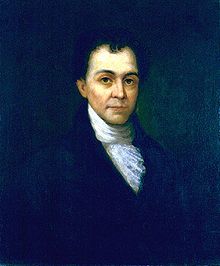American politician
This article includes a list of general references, but it lacks sufficient corresponding inline citations . Please help to improve this article by introducing more precise citations.(February 2012) ( Learn how and when to remove this message ) |
- ↑ Gannett, Henry (1905). The Origin of Certain Place Names in the United States. Govt. Print. Off. pp. 148.
 This article incorporates public domain material from websites or documents of the Naval History and Heritage Command .
This article incorporates public domain material from websites or documents of the Naval History and Heritage Command .
External links
- SCIway Biography of Paul Hamilton
- NGA Biography of Paul Hamilton
- Paul Hamilton at Find a Grave
- Paul Hamilton Papers at the University of South Carolina Library's Digital Collections Page (letters from 1802 to 1812)
Paul Hamilton | |
|---|---|
 | |
| 3rd United States Secretary of the Navy | |
| In office May 15, 1809 –January 1, 1813 |
| Political offices | ||
|---|---|---|
| Preceded by | Governor of South Carolina 1804–1806 | Succeeded by |
| Government offices | ||
| Preceded by | United States Secretary of the Navy 1809–1812 | Succeeded by |
|  | |
| Secretaries |
|    | ||||
|---|---|---|---|---|---|---|
| Under Secretaries | ||||||
| Assistant Secretaries | ||||||
| Secretary of State |
|  |
|---|---|---|
| Secretary of the Treasury |
| |
| Secretary of War |
| |
| Attorney General |
| |
| Secretary of the Navy |
| |
| International | |
|---|---|
| National | |
| People | |
| Other | |